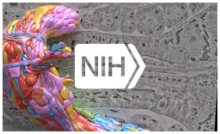
In January, members of the NIH BRAIN Initiative Neuroethics Working Group (NEWG) and Multi-Council Working Group (MCWG) met virtually to discuss emerging ethics themes in BRAIN and ongoing efforts to promote and enhance diversity, equity, and inclusion in neuroscience.
On January 26, 2021, the NIH BRAIN Initiative Neuroethics Working Group (NEWG) held its twelfth meeting. This group of experts in neuroethics and neuroscience ensures that ethics is fully integrated into BRAIN as new tools and technologies emerge. Meeting participants discussed emerging themes in neuroethics, possible future workshop topics, and revisited BRAIN 2.0 neuroethics themes.
Dr. John Ngai, Director of the NIH BRAIN Initiative, started off the meeting by highlighting the importance of working towards equity, in general, and in neuroethics. Next, Dr. Saskia Hendriks (NIH Bioethics and NINDS) summarized key findings from a portfolio analysis on emerging neuroethical themes in BRAIN grants awarded in fiscal year 2020. She summarized 12 common themes, which fell into two broad groups of potential ethical challenges: conducting research ethically; and the implications of research, tools, and technologies on individuals, groups, and society. Several themes, which aligned with those in the BRAIN 2.0 neuroethics report, were considered as possible future workshop topics. Potential topics included ‘best practices’ for neural data collection, sharing, and storage, as well as post-trial obligations to research participants (e.g., who pays for post-trial care?). The group also discussed ways to incorporate diversity, equity, and inclusion efforts into NEWG workshops.
Following the workshop discussion, Dr. Christine Grady (NIH Bioethics) revisited neuroethics themes from BRAIN 2.0 with the group. Participants discussed a few themes in detail, including integrating neuroethics and neuroscience, and public engagement in neuroethics. They expressed interest in finding new ways to engage the research community and the public in neuroethics, possibly by promoting research partnerships and creating educational resources. To learn more about this meeting, view the NEWG meeting summary(pdf, 142 KB) and archived videocast.
The following day, the Multi-Council Working Group (MCWG) and the NEWG met to discuss ongoing BRAIN and NIH efforts to promote and enhance diversity, equity, and inclusion in neuroscience, and two funding concepts. The MCWG coordinates efforts across the NIH and provides input on the long-term scientific vision of BRAIN.
Dr. Ngai updated the group on COVID-19 funding eligibility adjustments to BRAIN grant applications and summarized NIH COVID-19 funding opportunities. He also reminded participants of the boost in Congressionally appropriated BRAIN funds for fiscal year 2021 and upcoming workshops. To set the stage for the day’s meeting, Dr. Ngai highlighted the Initiative’s active role in enhancing scientific excellence and diversity in neuroscience, including a recent RFI to gather input on advancing scientific workforce diversity (NOT-MH-20-051) and other activities.
Next, Drs. Jay Churchill (NIMH) and Michelle Jones-London (NINDS) gave a presentation on BRAIN activities and future efforts to enhance training, inclusion, and equity. They overviewed related funding opportunities sponsored by BRAIN and the NIH Blueprint for Neuroscience Research and discussed a host of ongoing diversity efforts, such as encouraging research supplements to promote diversity, organizing outreach events at conferences, hosting peer-to-peer networking events, and many others. Next, Dr. Marie Bernard (NIA) discussed approaches to diversifying the scientific workforce. In her presentation, Dr. Bernard highlighted the benefits of diversity in biomedical research and recommended best practices for promoting diversity, including reducing implicit bias and facilitating institutional and cultural change. She also mentioned diversity success stories and recent NIH-supported efforts to enhance diversity, such as the NIH Distinguished Scholar Program (DSP) and Faculty Institutional Recruitment for Sustainable Transformation (FIRST) program. After these presentations, the MCWG discussed the role of BRAIN in promoting these efforts. The group acknowledged the importance of supporting early career opportunities and partnerships between minority-serving and resource-rich institutions in ensuring a diverse scientific workforce.
Lastly, NIH staff presented two concepts for funding: (1) short courses on neuroscience skills development; and (2) projects for building infrastructure for reagent development, production, and use at minority-serving and IDeA-eligible institutions, which will expand upon a transformative project aimed to create a cell-type-specific armamentarium. Meeting participants discussed potential course topics, including computational analysis, data management, and neuroethics. They also considered the importance of recruiting instructors and participants from diverse career stages, backgrounds, and geographic locations. For the second concept, the MCWG recognized the value of fostering robust partnerships between under-resourced (or minority-serving) and resource-rich institutions to BRAIN and neuroscience as a whole. For more details about meeting discussions, please read the MCWG meeting summary(pdf, 155 KB) and archived videocast.
The next NEWG and MCWG meetings will take place on August 19 and May 20, 2021.
